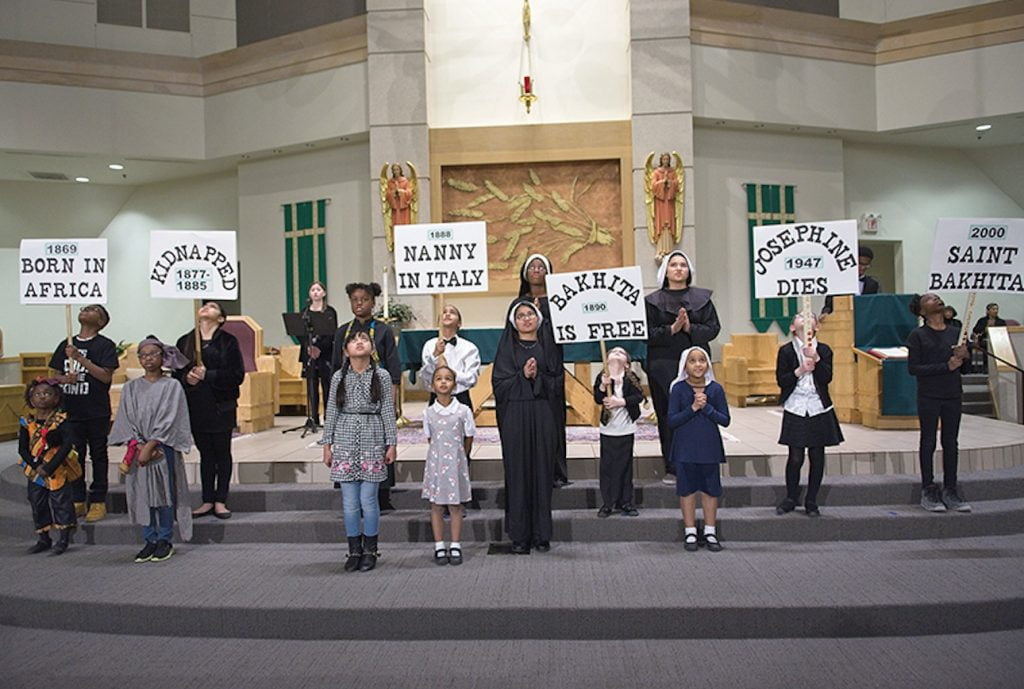
by Jill Ragar Esfeld
jill.esfeld@theleaven.org
LENEXA — “Racism is a moral problem that requires a moral remedy — a transformation of the human heart — that impels us to act.”
With this statement, Catholic bishops, in their pastoral letter against racism issued last November, invite the faithful to be open to the reality of racism in our culture and to unite in an effort to become peacemakers.
The Archdiocese of Kansas City in Kansas took a first step along that path on Feb. 8 when Holy Family School of Faith, the office for black Catholics, and the office for social justice presented “Open Our Hearts to Racial Healing,” an evening of reflection held at Holy Trinity Church in Lenexa.
Presentations focused on improving race relations, healing from injustice and reshaping our understanding of equity.
The event drew more than 100 people.
As he welcomed the audience, Bill Scholl, consultant for the archdiocesan office of social justice, said, “This experience for me has been eye-opening and a chance for conversion.
“I hope this evening can be that for you.”
Holy Trinity’s sister church, Our Lady & St. Rose, Kansas City, Kansas, provided the evening’s entertainment, with performances by its gospel choir directed by Lorraine Long.
The Young Disciples in Training, members of a religious education program at Our Lady & St. Rose, delighted the audience with a play celebrating the life of St. Josephine Bakhita.
Narrators told the saint’s story, as children in period costumes illustrated the various moments in St. Josephine’s life, from the time she was born until she was canonized.
The play, written and directed by director of religious education Franchiel Nyakatura, told a story of suffering, injustice, forgiveness and Christ’s power to heal.
Scholl said the play was an analogy of what the evening was about.
“We’re here to celebrate conversion,” he said. “We’re here to celebrate forgiveness, listening and Christ’s power to heal.
“Our country needs that right now, more than anything,” he continued, “especially on this issue, we need eyes to see and hearts to heal.”
Scholl and Bea Swoopes then introduced a video illustrating the benefits of growing up with privilege — and how it creates an unlevel playing field in life’s journey toward prosperity.
“White people might look at the success of the past and be tempted to think that racism in our country is pretty much over,” said Scholl. “However, an intentional listening to people of color reveals that residue of our racist past persists.”
He asked the audience to be aware of continued differences between blacks and whites in pay, education, housing discrimination, mortgage lending and even continuing school segregation.
“It is simply naive to think that hundreds of years of white supremacy in this country does not leave a legacy,” he said.
Swoopes agreed, acknowledging that great strides have been made in undoing the sin of racism, but there is still work ahead.
“As Catholics,” she said, “We believe in integral human development, which means we don’t realize our full dignity in society until everyone has full dignity in that society.
“This reckoning starts with realizing the playing field is not quite so level as it looks.”
The evening featured a catechetical reflection by Dr. Troy Hinkel on the Catholic bishops’ pastoral letter against racism, “Open Wide Our Hearts: The Enduring Call to Love.”
Hinkel, the co-founder and vice president of Holy Family School of Faith, encouraged everyone to get a copy of the letter and read it — and then take small steps to answer the bishops’ call for action.
“I can’t change the world,” he said. “But I can change me. This is a step in the right direction.”
He talked about the Catholic family and how God calls us to himself — drawing us closer to each other as we are drawn to him.
“That is a reality that must be lived,” he said. “How is it lived? Through the process of conversion of the heart where we realize I need my neighbor who is my family.”
The evening ended with a reception that gave participants an opportunity to meet and discuss what they learned.
“I hope for a movement that will go beyond this evening and this church,” said Scholl. “I hope it will equip you to start a conversation about racism with your family and your friends.”






